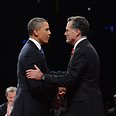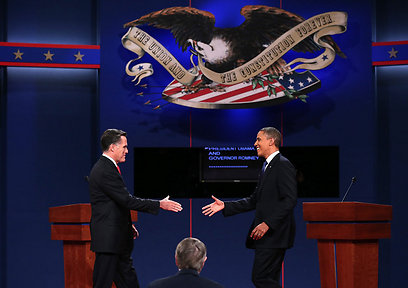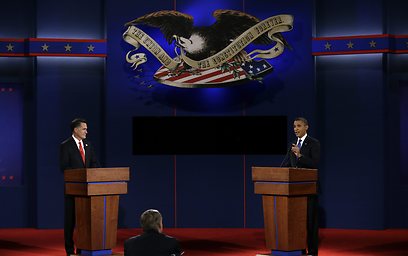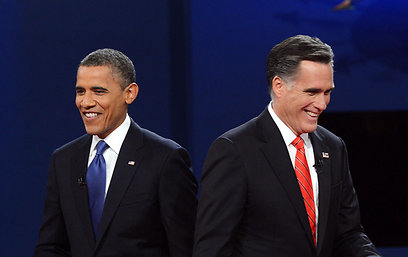

The first debate focused on domestic policy. Following tradition, presidential debate topics were divided into six segments of approximately 15 minutes each.
Related stories:
- Poll: Romney decreases gap, but not in key states
- Poll: 0% of African Americans support Romney
- Op-ed: The American vote
The debate was moderated by veteran journalist Jim Lehrer, who was hosting his 12th presidential or vice-presidential debate.
Clashing over the economy
As the debate focused on domestic policy, the US economy – which is still reeling from the financial crisis of 2008-2009 – along with the healthcare crisis, education and the woes of the US job market, took center stage.
In his opening statement, Obama commented on the economic crisis: "We all know we have a lot of work to do. We must invest in education and training, we have to invest in energy sources, change taxes… and reduce the deficit in a balanced way."
Romney's opening statement began with wishing the president and First Lady Michelle Obama a happy anniversary, jesting: "I'm sure this is the most romantic place you could imagine – here with me!"
Commenting on the economy, he said the US should focus on creating more jobs and balancing the budget. "I know how to start a business," he said.
'No new taxes for middle class'
The two candidates then plunged into economic issues with Obama arguing his plans would ultimately lead to strong job growth and Romney charging Obama's policies had failed to turn around the economy and make a significant dent in the 8.1% unemployment rate.

Obama and Romney in Denver (Photo: Reuters)
Romney laid out a five-point economic plan and accused the Democrat of relying too heavily on big government: "The president has a view very similar to the one he had when he ran for office four years ago, that spending more, taxing more, regulating more, if you will, trickle-down government would work. That's not the right answer for America," Romney said.
Speaking of tax policies, the GOP candidate said that "Mid-income Americans have been crushed by the president's policies." He added that there could be "No tax cut that will add to the deficit," and that he will not reduce the taxes paid by high-income Americans.
"I will not, under any circumstances, raise taxes on mid-income families. I will lower them," he declared.
Obama responded by arguing that he prevented a meltdown after inheriting an economy in freefall from the Republican administration of George W. Bush.
Romney, the president warned, would reinstate the Bush-era policies that led to the financial crisis in the US and help rich people, while hurting the poor and the middle class. "I said I would cut taxes for middle class families and I did. I believe we do best when the middle class does," he said.
Debating healthcare
"For five months now (Romney) has been running with this plan that is essentially 'never mind.' At the same time, my tax plan has lowered taxes for 98% of the families... it has also reduced taxes for small businesses."
Obama noted that he would like to see he US go back to the tax policies implemented during the Clinton Administration, which created a budgetary surplus.
'I've come to like the term 'Obamacare''
One of the issues discussed in the debate was the US healthcare crisis, and the controversial Medicare program.
Obama noted that the vouchers plan fostered by the Republicans was "not the right way to go," as it will make elderly people pay hundreds of dollars more for prescriptions.
Obama took a jab at those criticizing his healthcare plan, which will require some further cuts, noting that "I've now become fond of the term 'Obamacare.'"

Friendly jabs (Photo: AP)
Romney, for his part, said that neither the GOP or the president were suggesting changing entitlements for social security and Medicare for retirees and soon-to-be retirees.
"I don't understand how you can cut Medicare... For young people, social security and Medicare will be there for them without question," under a Romney administration, he said.
Obama said Romney’s plan would weaken Medicare, adding that "America needs to lower the cost of health care."
Romney noted that the government needs to offer premiums as low as the private sector, which would allow people to choose their own health plan. "Not all people want the government to tell them what do to about their own health care," he said.

(Photo: AP)
Crucial elections
In his closing statement, Romney noted: "This is an important election. I'm concerned about America… it's an election about the course of America."
He also noted that "there are developments in the Middle East that are of great concern."
Obama said that American people have inspired him: "I promised to fight every single day for the American people – a promise I kept… I promise I’ll fight just as hard," in a second term, he said.
The 90-minute encounter, broadcast by most US networks, is believed to have reached 60 million people on television – a far bigger audience than watched either candidate speak at the Democratic and Republican conventions.
The next two presidential debates are scheduled to be held on October 16, in Hempstead, New York, and October 22 in Boca Raton, Florida.
Biden and Romney's running mate Paul Ryan, will debate once, on October 11, in Danville, Kentucky.
Sharon Gilad and Reuters contributed to this report
- Receive Ynetnews updates
directly to your desktop















